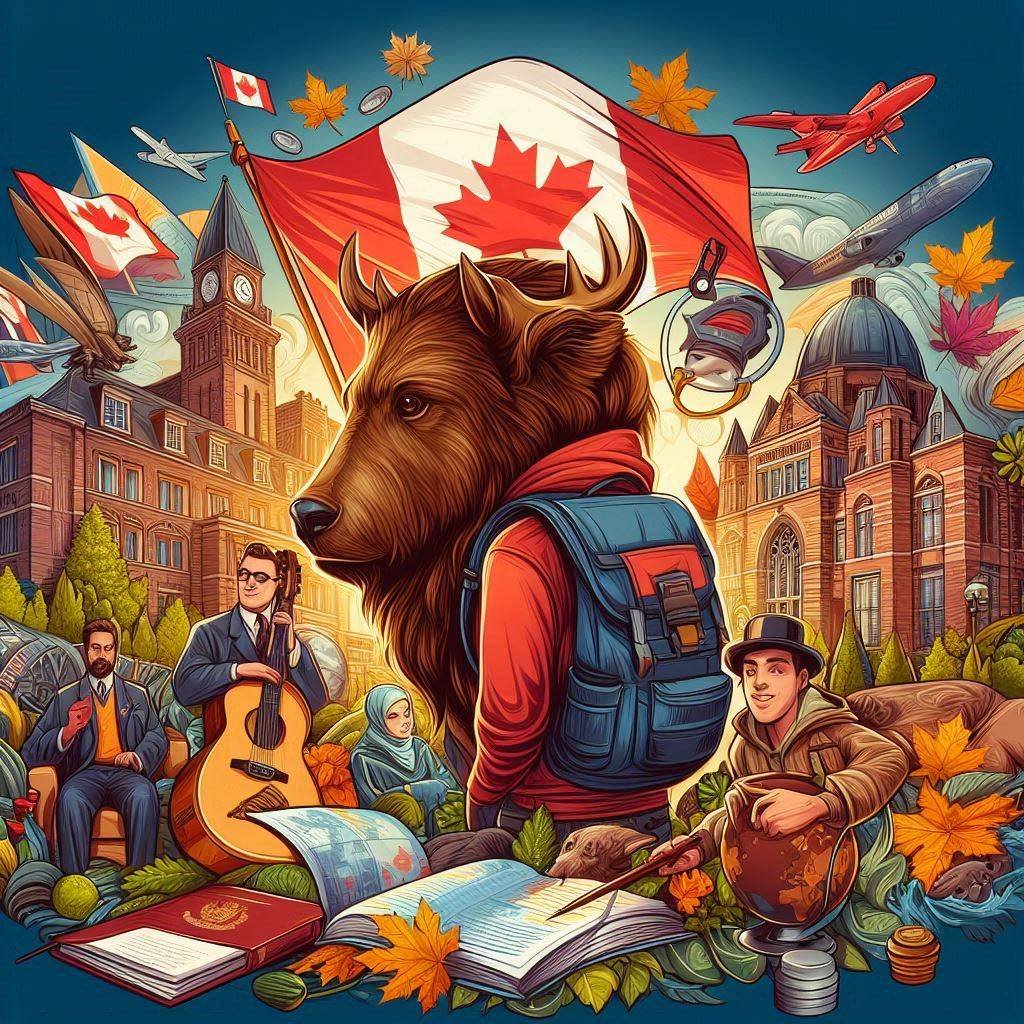Are you dreaming of pursuing a masters degree in country known for its stunning landscapes, diverse culture, and world-class education system? Look no further than Canada! As someone who’s been through the process of researching, applying, and completing a masters in Canada , I’m excited to share my insights and help you navigate your own journey towards advanced education in the Great White North.
Why Choose Canada for Your Master’s Degree?
Before we dive into the nitty-gritty details, let’s talk about why Canada is such an attractive destination for graduate students from around the world. Trust me, there are plenty of reasons!
- World-Class Education: Canadian universities consistently rank among the best globally. According to the QS World University Rankings 2024, three Canadian universities are in the top 50 worldwide.
- Cultural Diversity: Canada is a melting pot of cultures, making it an incredibly welcoming place for international students. You’ll have the opportunity to interact with people from all walks of life, broadening your perspectives and building a global network.
- Research Opportunities: With significant government funding for research, Canadian universities offer cutting-edge facilities and opportunities to work on groundbreaking projects.
- Post-Graduation Work Prospects: The Post-Graduation Work Permit Program (PGWPP) allows international students to work in Canada for up to three years after completing their studies.
- Quality of Life: Canada consistently ranks high in quality of life indices, offering a safe, clean environment with excellent healthcare and social services.
Now that we’ve covered why Canada is an excellent choice let’s delve into the details of pursuing your master’s degree in this incredible country.
Types of Master’s Programs in Canada
Canadian universities offer a variety of master’s programs to suit different academic and career goals. Here are the main types you’ll encounter:
1. Master of Arts (MA)
MA programs typically focus on humanities, social sciences, and some professional fields. These programs often involve a combination of coursework and research, culminating in a thesis or major research paper.
Popular MA Programs:
2. Master of Science (MSc)
MSc programs are typically offered in scientific and technical fields. These programs often involve intensive research and lab work, alongside coursework.
Popular MSc Programs:
3. Master of Business Administration (MBA)
MBA programs are designed for those looking to advance their careers in business and management. These programs often emphasize practical skills and real-world applications.
Popular MBA Specializations:
4. Professional Master’s Programs
These programs are designed for specific professions and often lead to professional designations.
Examples:
- Master of Education (MEd)
- Master of Engineering (MEng)
- Master of Social Work (MSW)
- Master of Public Health (MPH)
Top Universities for Master’s Programs in Canada
Canada boasts numerous excellent universities, but some stand out for their graduate programs. Here’s a list of some top institutions to consider:
- University of Toronto
- Ranked 21st globally (QS World University Rankings 2024)
- Known for: Strong research programs, diverse range of disciplines
- Learn more about U of T
- McGill University
- Ranked 30th globally
- Known for: Medical sciences, engineering, business
- University of British Columbia (UBC)
- Ranked 34th globally
- Known for: Sustainability research, computer science
- UBC Financial Aid Information
- University of Waterloo
- Known for: Engineering, computer science, co-op programs
- University of Alberta
- Known for: Life sciences, engineering, business
- Alberta MBA Scholarships
- McMaster University
- Known for: Health sciences, engineering
- Western University
- Known for: Business, medical sciences
- Queen’s University
- Known for: Business, law, engineering
Remember, the “best” university depends on your specific field of study and personal preferences. I recommend researching each university’s specific programs in your area of interest.
Admission Requirements for Master’s Programs
While requirements can vary between universities and programs, here are some general admission requirements for master’s programs in Canada:
- Bachelor’s Degree: A completed undergraduate degree from a recognized institution, usually in a related field.
- GPA Requirement: Most programs require a minimum GPA, often around 3.0 on a 4.0 scale.
- Language Proficiency: If English isn’t your first language, you’ll need to prove your proficiency through tests like IELTS or TOEFL.
- Letters of Recommendation: Usually 2-3 letters from academic or professional references.
- Statement of Purpose: An essay outlining your academic and career goals.
- Resume/CV: A summary of your academic and professional experiences.
- Standardized Test Scores: Some programs may require GRE or GMAT scores, especially for business and some science programs.
Tips for a Successful Application
- Start Early: Begin your application process at least a year before your intended start date.
- Research Thoroughly: Understand the specific requirements for each program you’re applying to.
- Tailor Your Application: Customize your statement of purpose and CV for each program.
- Secure Strong References: Choose recommenders who can speak to your academic and professional abilities.
- Highlight Your Achievements: Emphasize any research experience, publications, or relevant work experience.
- Proofread Carefully: Ensure all your application materials are error-free and well-presented.
Financing Your Master’s Degree in Canada
Let’s talk about one of the most crucial aspects of pursuing a master’s degree: financing. While studying in Canada can be a significant investment, there are numerous ways to fund your education.
Tuition Fees
Tuition fees for master’s programs in Canada vary widely depending on the university, program, and whether you’re a domestic or international student. On average, you can expect to pay:
- Domestic students: CAD 7,000 – CAD 25,000 per year
- International students: CAD 15,000 – CAD 55,000 per year
Living Costs
Living costs will depend on the city and your lifestyle. Budget for approximately CAD 12,000 – CAD 20,000 per year for accommodation, food, transportation, and other expenses.
Scholarships and Financial Aid
Canada offers numerous scholarships and financial aid options for master’s students:
- University Scholarships: Many universities offer scholarships based on academic merit or financial need. For example, check out the University of British Columbia Financial Aid options.
- Government Scholarships: The Canadian government offers several scholarships for international students. Visit the EduCanada website for more information.
- External Scholarships: Many organizations offer scholarships for graduate studies. Check out this list of scholarship opportunities in Canada.
- Research and Teaching Assistantships: Many universities offer positions as research or teaching assistants, which can help offset costs.
Student Loans
If you need additional funding, consider these loan options:
Student Visa and Work Permits for International Students
If you’re an international student planning to pursue a master’s degree in Canada, you’ll need to obtain the necessary permits:
Study Permit
A study permit is required for international students studying in Canada for more than six months. To apply for a study permit, you’ll need:
- Acceptance letter from a Designated Learning Institution (DLI)
- Proof of funds to cover tuition and living expenses
- Valid passport
- Police clearance certificate
- Medical examination results
For more information, visit the IRCC Canada Visa page.
Post-Graduation Work Permit (PGWP)
The PGWP allows international students to work in Canada after completing their studies. The duration of the PGWP depends on the length of your study program, up to a maximum of three years.
Working While Studying
International students can work part-time (up to 20 hours per week) during regular academic sessions and full-time during scheduled breaks without a separate work permit.
Life as a Master’s Student in Canada
Now, let’s talk about what life is really like as a master’s student in Canada. Trust me, it’s not all about hitting the books (although that’s certainly a big part of it)!
Academic Life
Master’s programs in Canada are typically intense and demanding. You’ll likely find yourself juggling coursework, research, and possibly teaching or research assistant duties. However, the academic environment is generally supportive, with professors who are approachable and willing to help.
Campus Life
Canadian universities offer a vibrant campus life with numerous clubs, societies, and events. Whether you’re into sports, arts, or academic pursuits, you’ll find like-minded individuals to connect with.
Cultural Experiences
One of the best parts about studying in Canada is the opportunity to immerse yourself in a diverse, multicultural environment. You’ll have the chance to learn about different cultures, try new cuisines, and perhaps even pick up a new language!
Weather
Let’s address the elephant in the room – yes, Canadian winters can be cold! But don’t let that deter you. With the right clothing (layers are key!), you’ll be able to enjoy all four seasons, including beautiful snowy landscapes and cozy indoor activities during winter.
Healthcare
Canada has a publicly funded healthcare system. As an international student, you’ll typically be required to have health insurance, often provided through your university.
Safety
Canada is generally considered a safe country with low crime rates. However, always take normal precautions and familiarize yourself with local safety guidelines.
Career Prospects After Your Master’s in Canada
One of the most exciting aspects of pursuing a master’s in Canada is the career opportunities that open up after graduation.
Job Market in Canada
Canada’s job market is robust and diverse, with opportunities in various sectors such as:
- Technology and innovation
- Finance and business
- Healthcare and life sciences
- Natural resources and energy
- Creative industries
Post-Graduation Work Options
- Post-Graduation Work Permit (PGWP): This allows you to work in Canada for up to three years after graduation.
- Express Entry: This is a system for skilled workers to apply for permanent residency in Canada.
- Provincial Nominee Programs: These offer opportunities for international graduates to be nominated for permanent residency by specific provinces.
Networking and Career Services
Take advantage of:
- University career centers and job fairs
- Alumni networks
- Professional associations in your field
- Co-op and internship programs
Tips for Success in Your Canadian Master’s Program
As someone who’s been through the process, here are my top tips for success:
- Time Management is Key: Master’s programs can be intense. Develop good time management skills early on.
- Build Relationships: Network with your professors and peers. These connections can be invaluable for your academic and professional future.
- Take Advantage of Resources: Universities offer numerous resources like writing centers, career services, and counseling. Use them!
- Embrace the Culture: Participate in cultural events and activities. It’s a great way to combat homesickness and broaden your perspectives.
- Learn French: While not necessary everywhere, knowing some French can be a big advantage, especially if you’re considering staying in Canada long-term.
- Stay Healthy: Don’t neglect your physical and mental health. Most universities offer gym facilities and counseling services.
- Explore Canada: Take time to travel and explore this beautiful country. It’s an education in itself!
Conclusion
Pursuing a master’s degree in Canada is an exciting journey that offers world-class education, cultural experiences, and excellent career prospects. From choosing the right program and university to navigating the application process and student life, I hope this guide has given you a comprehensive overview of what to expect.
Remember, every student’s journey is unique. While challenges may arise, the rewards of studying in Canada – both personal and professional – are immeasurable. So take the leap, embrace the adventure, and get ready for an unforgettable educational experience in the Great White North!
Frequently Asked Questions
How long does it take to complete a master’s degree in Canada?
Most master’s programs in Canada take 1-2 years to complete, depending on the field of study and whether the program includes a thesis component.
Can I work while studying for my master’s in Canada?
Yes, international students can work up to 20 hours per week during regular academic sessions and full-time during scheduled breaks.
What are the language requirements for master’s programs in Canada?
Most programs require proof of English proficiency through tests like IELTS or TOEFL. Some universities in Quebec may require French proficiency.
Are there age restrictions for pursuing a master’s degree in Canada?
Generally, there are no age restrictions for master’s programs in Canada. Students of all ages are welcome to apply.
Can I bring my family with me while studying for my master’s in Canada?
Yes, you can bring your spouse and dependent children with you. They may be eligible for open work permits or study permits.
What are the chances of getting a job after completing a master’s in Canada?
The job market for master’s graduates in Canada is generally strong, especially in fields like technology, healthcare, and business. The Post-Graduation Work Permit also provides an excellent opportunity to gain Canadian work experience.
Are there part-time or online master’s programs available in Canada?
Yes, many universities offer part-time and online master’s programs. Check with specific institutions for their offerings.
How much does it cost to live in Canada as a master’s student?
Living costs vary depending on the city and lifestyle, but you should budget for approximately CAD 12,000 – CAD 20,000 per year for living expenses.
Can I apply for permanent residency after completing my master’s in Canada?
Yes, there are several pathways to permanent residency for international students who complete their studies in Canada, including the Express Entry system and Provincial Nominee Programs.
Are there opportunities for research assistantships or teaching assistantships for master’s students?
Many universities offer research and teaching assistantships to master’s students. These positions can provide valuable experience and financial support.















